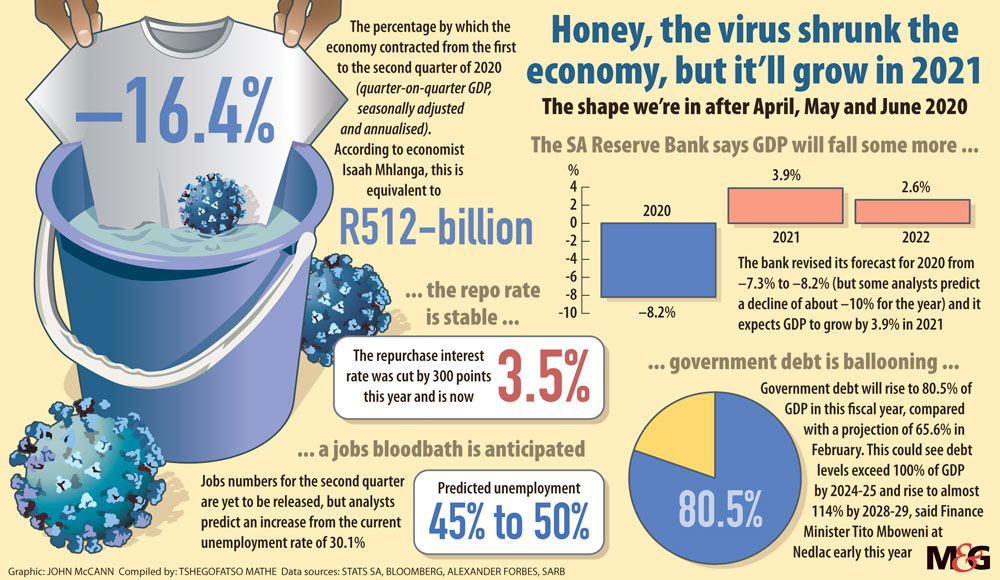Government, labour, business and community have come up with a combined economic recovery plan amidst three others to help kickstart the economy. (Jacques Stander/Gallo Images via Getty Images)
The South African economy has been in a downward spiral for the past five years. The pandemic has simply exacerbated it. However, the four plans released in the past three months, focused on how to restart the country’s ailing economy, are interactions of old strategies.
The latest by the National Economic Development and Labour Council (Nedlac) was released last week. Previously, Business for South Africa (B4SA) released their plan titled, ‘A New Inclusive Economic Future for South Africa’ and in the same month, the ANC’s economic transformation committee released theirs called ‘Reconstruction, Growth And Transformation: Building A New, Inclusive Economy’.
The government released theirs, in August titled ‘The Economic Reconstruction, Recovery and Growth Plan’. The plans all have three key focuses, economic growth, job creation and infrastructure investment.
However, according to experts, the plans are oblivious to the effects of the Covid-19 pandemic on the economy. Instead, they reiterate old strategies the ANC-led government failed to implement over the years it’s been in power.
For instance, though the ANC plan concedes that the pandemic has further revealed the painful persistence of South Africa’s apartheid fault lines, and millions of people are locked out of the economy, it harks back to the basics of the Reconstruction and Development Programme (RDP) and the National Development Plan (NDP) as a means to restart the economy.
Many of the aspects of these “new” plans can found in the NDP, released back in 2011, by the national planning commission appointed by former president Jacob Zuma.
A year after the release of the NDP plan, the government adopted the National Infrastructure Plan, which aimed to maintain and build new infrastructures such as ports, roads, railway systems, electricity plants, hospitals, schools and dams. These recommendations are also included in an iteration of the new Nedlac plan.
Peter Attard Montalto, head of Capital Markets Research said that: “the commitments…Are the usual. One might say that it is meaningful to write down these commitments and indeed Nedlac is now pushing the government to commit to timelines”.
He said one reads all of these plans and says “‘fine’ – but so what?
“There are the same implementation issues and capacity issues that the president has bemoaned, but also no new thinking”.
On April 25, 2020, the National Planning Commission released a draft policy paper which looked into public infrastructure delivery. It said that the building of mega-projects such as Medupi where time and cost-overruns were incurred, indicates the degree to which mismanaged mega projects can damage the economy.
 (John McCann/M&G)
(John McCann/M&G)
Another iteration of the NDP, presented anew in the economic recovery plans is the speeding up and auctioning off of spectrum to license holders by March 2021.
But releasing the spectrum has been a slow process. In his first state of the nation address (SONA) in 2018, President Cyril Ramaphosa said that they would finalise engagements “with the telecommunications industry and other stakeholders to ensure that the allocation of spectrum reduces barriers to entry, promotes competition and reduces the cost to consumers”.
In creating jobs, the Nedlac report proposes that people must buy local – it goes as far as to recommend campaigns promoting this. Additionally, the ANC plan says that for an economic recovery to happen industrial policy objectives should ensure localisation of manufacturing. This is something the Nedlac plan proposes as well stating that platforms used to locally manufacture personal protective equipment (PPE) should be expanded to other targeted sectors and large volume items where practical and feasible.
However, since 2013 the department of trade and industry has been driving and advertising the campaign to buy local.
Neva Makgetla, a senior researcher at TIPS, said some of the plans are so “vague, so broad” and, “they are thinking as if things haven’t changed”.
Makgetla said that to rebuild the economy, we need to start understanding what has Covid-19 done to it. Because otherwise, we end up saying there is a downturn, let’s do the things we have been proposing “forever”, instead of saying things are different now, she said.
“As long as the virus is not under control, there are some things we completely cannot do, The (Nedlac) plan seeks to promote tourism by way of marketing it and rolling out the e-visa programme and visa waivers where possible.” This is also something the ANC plan suggests. It called for increasing the processing capacity in the rollout of e-visa applications.
She added that at this time, international tourists could not flood the country due to the possibility of a resurgence.
“Until the virus is under control, the recovery plan will be hobbled to some extent”, she said.
The government, ANC and Nedlac plan all focus on public employment programmes, but Makgetla said that more labour intensive work tends to be risky because of Covid-19, so the government should be thinking about how they can manage that.
She also said the government should also look into venture capital instead of the low-uptake loan guarantee scheme.
Makgetla added that there should be a solidarity tax, because that is what the crisis is about, helping those with fewer resources.
Independent economist Duma Gqubule said the government should work on a stimulus package that is a mix of job creation, infrastructure and focus on consumer consumption spending.
“What we are faced with is a humanitarian crisis, and none of the plans addresses that,” he said.
He added that in its plans, the government needs to focus on people first then the economy.
“They are putting the cart before the horse.”
Tshegofatso Mathe is an Adamela Trust business reporter at the Mail & Guardian